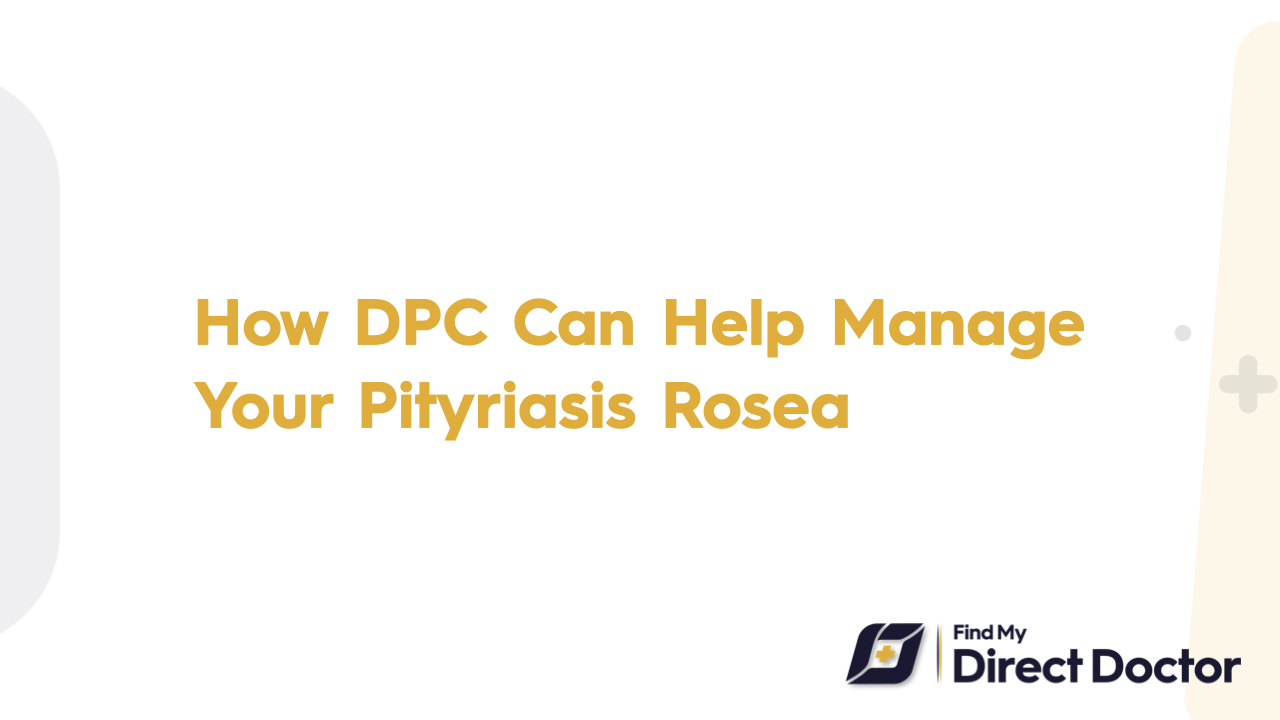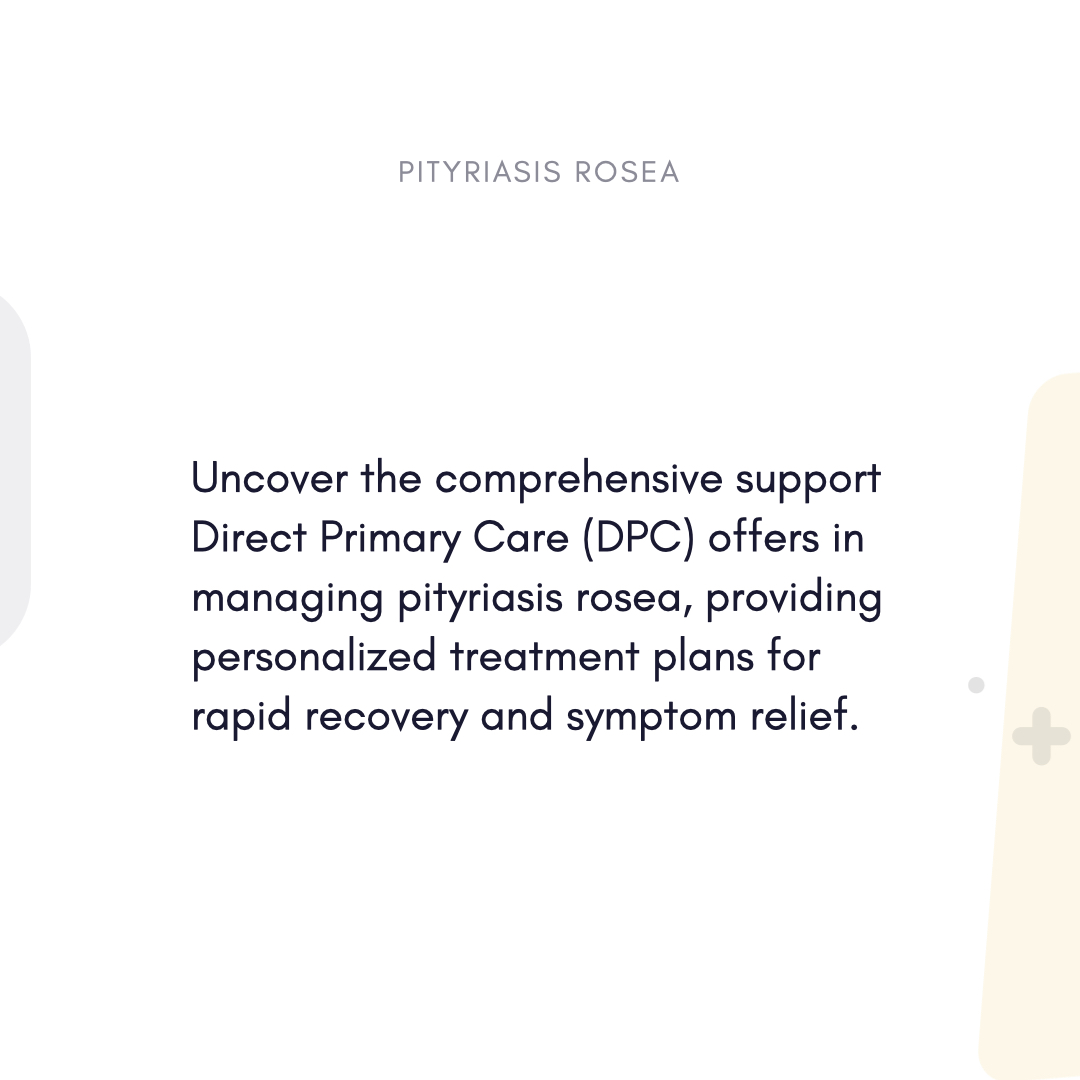Pityriasis Rosea and Direct Primary Care (DPC): Soothing the Mysterious Rash with Personalized Care
One scaly patch bursting into a Christmas-tree rash. Itching that disturbs your nighttime sleep. For one in a thousand persons with Pityriasis Rosea (PR), this enigmatic skin disorder is not only aesthetically unpleasant but also a months-long ordeal. Usually dismissed as "just a virus," traditional treatment leaves patients to suffer through the itching. Direct Primary Care (DPC), however, offers proactive, customized treatment to reduce symptoms and hasten healing.

Gaining Knowledge of Pityriasis Rosea
Often brought on by viral infections (e.g., HHV-6/7), Pityriasis Rosea (PR) is a self-limiting rash. Important traits:
- Patch for Herald: One oval, scaly lesion typically on trunk
- Smaller pink "fir tree" pattern secondary rash
- Mild to severe, lasts six to eight weeks. Itching
Mismanagement carries hazards:
- Secondary infections resulting from scratches
- Anxiety brought on by similarity to serious diseases (such as syphilis, psoriasis)
While ruling out mimics, the American Academy of Dermatology advises symptom control.
DPC Transforms: How PR Maintenance
Operating on a membership model usually ranging from 50 to 100 USD per month, Direct Primary Care (DPC) provides unlimited access to your physician for a set fee. This translates for PR patients into no co-pays, no hurried visits, and a treatment plan as distinctive as your rash.
1. Quick Diagnosis and Confidence
The easily available DPC model guarantees:
- Same-day evaluations for the spreading rash or herald patch.
- KOH scrapings and RPR/VDRL will help to rule out fungal or syphilitic rashes at reasonable cost.
- Prescription antihistamines (e.g., cetirizine) or topical steroids offers instant relief.
2. Customized, Evidence-Based Therapy
DPC doctors design customized plans compliant with dermatological recommendations:
- Severe situations: Erythromycin or oral acyclovir to cut length of stay.
- Control of itching: oatmeal baths or UVB phototherapy referrals.
- Counseling for anxiety about persistent rashness supports mental health.
3. All-Around, Reasonably Priced Assistance.
- By cutting medication costs—wholesale pricing for triamcinolone cream or antivirals—DPC lessens both financial and emotional burden.
- 24/7 telehealth access helps to control midnight itching or new patch issues.
- Education: Tracking development and dispelling misconceptions—such as PR isn't contagious.
DPC's Advantages for Patient PR
1. Unmatched Approachability
- Photo consultations available 24/7 to track rash spread outside of offices.
- Should PR mimics show up, there is no waiting for dermatologist referrals.
2. Customized Interventions
- Choosing calamine lotion instead of retinoids will help you to be pregnant-safe.
- Natural remedies: Under directed use, use coconut oil or colloidal oatmeal baths.
3. Open Cost: Transparency
- Membership consists in consultations, follow-ups, and care coordination—no hidden costs.
- Typical savings: 300+ USD by skipping markups in steroid cream and co-pays for urgent care.
Personal Success Stories from Real Life
- Case 1: Before her wedding, Emma, 28, got a chest rash. Her DPC doctor prescribed acyclovir, diagnosed PR, and set up UVB sessions. Three weeks faster than predicted, the rash cleared.
- Case 2: Liam, sixteen, suffered extreme itching misidentified as eczema. His DPC provider taught stress-reduction techniques, prescribed oral prednisone, and found PR. Four weeks later, symptoms went away.
Ask Questions About DPC and Pityriasis Rosea.
- Q: Can DPC treat cases confused for psoriasis or ringworm?
- A: It is indeed To confirm PR, DPC doctors order same-day fungal cultures or biopsies.
- Q: For uninsured patients, is DPC reasonably priced?
- A: Right away. Members avoid 200+ USD dermatology bills, save on labs, and medications.
- Q: Should I be seeing a dermatologist?
- A: DPC doctor collaboratively works with experts to guarantee cash-pay rates for challenging cases.
Why DPC Benefits Public Relations Clients?
Emphasizing DPC's alignment with dermatology best practices, the American Academy of Family Physicians supports:
- Accuracy: Early rule out of major mimics.
- Tools for tracking rash development and itching intensity empower you.
- Trust: Replacing scattered, contemptuous visits is a consistent care team.
Relax the Itch and Hasten Recovery
Pityriasis Rosea does not have to rob months of your life. DPC helps you to find a partner who listens carefully, acts quickly, and prepares you to heal—inside and outward.






